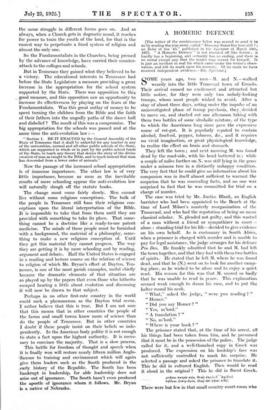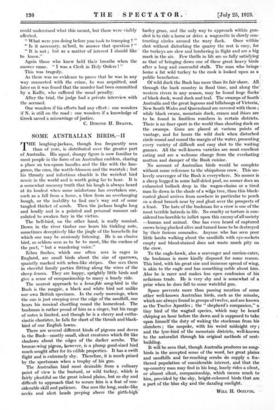A HOMERIC DEFENCE
[The writer of the reminiscence below was moved to send it to us by reading the true story, called " Does my Sister live here still ? : an Echo of the '45," published in the Spectator of March 14th, 1925. " A Homeric Defence " is not rounded off like fiction ; it hardly has a beginning, and certainly has no ending, and there is no moral except any that the reader may invent for himself. It is just an incident in real life which came under the writer's obser- vation, and left its mark upon his memory. Of its truth we have received independent evidence.—ED. Spectator.] SOME years ago, two men—M. and N.—walked wearily into the little Transvaal town of Ermelo. Their arrival caused no excitement and attracted but little notice, for they were only two unholy-looking tramps, whom most people wished to avoid. After a stay of about three days, acting under the impulse of an iminvestigated phase of tramp psychosis, they, decided to move on, and started out one afternoon taking with them two bottles of some alcoholic mixture, of the type to which the Americans long since gave the expressive name of rot-gut. It is popularly reputed to contain alcohol, fusel-oil, pepper, tobacco, &c., and it requires no vivid imagination, or great physiological knowledge, to realize the effect on brain and stomach.
They left the town ; and next morning M. was found dead by the road-side, with his head battered in ; while a couple of miles further on N. was still lying in the grass under a mimosa tree in a distinctly unhappy condition. The very fact that he could give no information about his companion was in itself almost sufficient to warrant the suspicion that he was concealing facts, and no one was surprised to find that he was committed for trial on a charge of murder.
The case was tried by Mr. Justice Blank, an English barrister who had been appointed to the Bench at the time of Lord Milner's masterly reorganization of the Transvaal, and who had the reputation of being no mean classical scholar. N. pleaded not guilty, and this wastrel of a man without a friend or sympathizer in court— alone : standing trial for his life—decided to give evidence on his own behalf. As is customary in South Africa, when a prisoner is charged with murder and is unable to pay for legal assistance, the judge arranges for his defence Pro Deo. He frankly admitted that he and M. had left the town together, and that they had with them two bottles of spirits. He stated that he left M. where he was found dead, and that he (N.) went on to look for another camp- ing place, as he wished to be alone and to enjoy a quiet read. His reason for this was that M. snored so badly that he was unable to read in peace. This explanation seemed weak enough to damn his case, and to put the halter round his neck.
" What," asked the judge, " were you reading ? " " Homer."
" Did you say Homer ? "
" Yes, m'lord."
" A translation ? "
" No, m'lord."
" Where is your book ?
The prisoner stated that, at the time of his arrest, all his things had been taken from him, and he. presumed that it must be in the possession of the police. The judge called for it, and a well-thumbed copy in Greek was produced. The expression on his lordship's face was not sufficiently controlled to mask his surprise. He selected a passage and asked the prisoner to translate it. This he did in cultured English. Then would he read it aloud in the original ? This he did in fluent Greek.
prim Warpot 00ZO, Eail Tie bce X' 'AxtXXer, rvX1sot, Cnrep tkoltr, oXi4 Erl y4ao: oL1145.
There were but few in that small country court-room who could understand what this meant, but those were visibly affected.
" What were you doing before you took to tramping " " Is it necessary, m'lord, to answer that question ? " " It is not ; but as a matter of interest I should like to know."
Again those who knew held their breaths when the answer came. " I was a Clerk in Holy Orders ! "
This was tragedy.
As there was no evidence to prove that he was in any way connected with the crime, he was acquitted, and later on it was found that the murder had been committed by a Kaffir, who suffered the usual penalty.
After the trial, the judge had 'a private interview, with the accused.
One wonders if his efforts had any effect : one wonders if N. is still on the road : one wonders if a knowledge of Greek saved a miscarriage of justice.
C. DIMOND H. -BRAINE.



























































 Previous page
Previous page